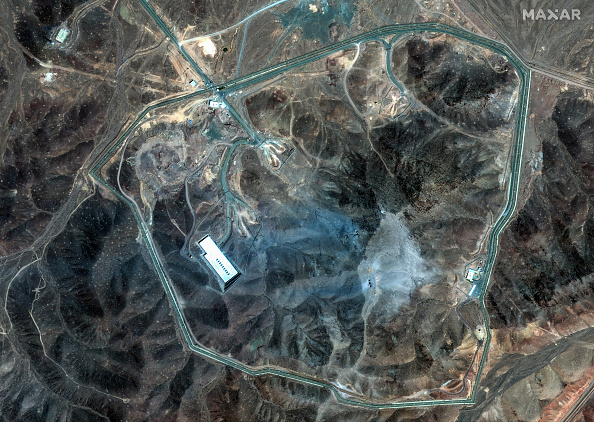"No one can solve this problem alone, but together we can change things for the better."
The Israeli-U.S. Strikes On Iran: A Strategic Blunder
July/August 2025
By Daryl G. Kimball
U.S. President Donald Trump’s decision to join Israel’s illegal military attacks against Iranian scientists and safeguarded nuclear sites represents an irresponsible departure from his earlier pursuit of diplomacy. It will increase the risk of a nuclear-armed Iran and erode confidence in the nuclear nonproliferation system.
Three days before Iranian and U.S. negotiators were to meet in Oman, Israel launched air strikes June 13. The attacks were designed to sabotage the talks as much as they were intended to damage Iran’s nuclear capabilities. Israeli Prime Minister Benjamin Netanyahu convinced Trump that U.S. participation was key to knocking out the most heavily fortified nuclear sites and coercing Iran to give up its nuclear program altogether. It did not.
The Israeli-U.S. military campaign—including heavy U.S. bombardment of underground portions of the Natanz and Fordow uranium enrichment plants and the Isfahan uranium conversion facility June 21—inflicted heavy damage but did not eliminate the program.

Iran’s nuclear knowledge, its stockpile of 400 kilograms of uranium enriched to 60-percent uranium-235, its centrifuge manufacturing capacity, its third underground enrichment site, and its determination to keep the nuclear program going remain.
Prior to Israel’s attack, there was no imminent threat posed by Iran’s nuclear program and diplomacy had not been exhausted. U.S. intelligence agencies assessed that Iran’s leaders had not yet decided to build a bomb, and it would take it a year or more to assemble a warhead small and light enough to be delivered on a ballistic missile.
Now, it might take Iran years to rebuild its enrichment plants to the scale of operations before the attacks. But it will take only months to enrich its supply of uranium enriched to 60 percent U-235 to bomb grade on a smaller scale and process it into metal for weapons, if Supreme Leader Ayatollah Ali Khamenei gives the go-ahead
Worse yet, the Israeli-U.S. strikes have severely reduced Iran’s incentives to allow the return of International Atomic Energy Agency (IAEA) inspection teams, which are essential to fully understand the status of Iran's nuclear activities and account for its nuclear material. On-site inspections are crucial if Iran wants to demonstrate that its program is not producing weapons.
In the long run, the illegal attack on Iran by two nuclear-armed states—the United States and Israel, which has refused to join the nuclear Nonproliferation Treaty (NPT) and has some 100 nuclear weapons—increases the chances that Iran may make the wrong decision, withdraw from the NPT and pursue a clandestine weaponization campaign.
There is a better decision—through serious nonproliferation diplomacy. The nuclear deal that Trump unilaterally abandoned in 2018, the Joint Comprehensive Plan of Action (JCPOA), imposed limits, prohibitions and intrusive inspection requirements on Iran that were to last for 10 or 15 years, with some being permanent. For example, the JCPOA prohibited uranium enrichment at Fordow before 2030 and barred any production of highly enriched uranium by Iran through 2030.
The prospect of further negotiations on a new durable framework to contain Iran’s sensitive nuclear activities has been severely damaged. But it is still possible and necessary that Iran and the United States resume talks on an interim agreement to stabilize the situation and work with Gulf states on a longer-term regional solution.
Given Iran’s still substantial nuclear potential, the first priority must be securing its agreement to allow the return of IAEA inspectors. To do so, Trump should agree to Iran’s call for guarantees that there will be no further U.S. or Israeli attacks on any Iranian nuclear facilities or scientists so long as the IAEA is allowed to do its work.
Second, Iran should agree to suspend uranium enrichment for at least a year and to transfer its stocks of enriched uranium to another country under safeguards. After all, Iran’s major enrichment sites will be inoperable for quite some time, and domestic uranium enrichment is not necessary for Iran’s current domestic nuclear energy needs.
In exchange, Washington should recognize Iran’s right to pursue the peaceful use of nuclear energy as outlined in Article IV of the NPT and agree that Iran can, in the future, engage in limited centrifuge manufacturing and low-level uranium enrichment as part of a regional nuclear fuel consortium with other Gulf states.
To increase the prospect for success, Trump should pledge to deliver relief from U.S. nuclear-related sanctions that were reimposed on Iran following the U.S. withdrawal from the JCPOA. France, Germany, and the United Kingdom must not reimpose international sanctions on Iran through the UN Security Council. The group also should acknowledge that the Israeli-U.S. strikes violated Article 2(4) of the UN Charter, which prohibits the threat or use of force in international relations.
All of this will require all sides to refrain from gratuitous threats and taunts, engage in serious sustained talks, and be willing to compromise enough to produce a win-win result. Although unlikely, such an outcome is vital to prevent the emergence of the tenth nuclear-armed state and the collapse of the nuclear nonproliferation system as we know it.
